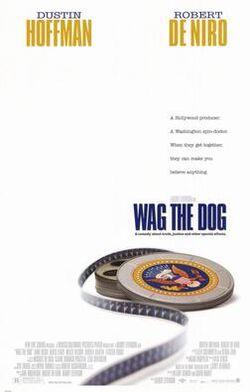Wag the dog
(film) | |
|---|---|
 | |
| Type | Fiction |
| Author(s) | • Hilary Henkin • David Mamet • Larry Beinhart |
| The film centers on a spin doctor and a Hollywood producer who fabricate an entire war | |
Wag the Dog is a 1997 American political satire black comedy film produced and directed by Barry Levinson and starring Dustin Hoffman and Robert De Niro.[1] The film centers on a spin doctor and a Hollywood producer who fabricate a war in Albania to distract voters from a presidential sex scandal. The screenplay by Hilary Henkin and David Mamet was loosely adapted from Larry Beinhart's 1993 novel, American Hero.
Plot
The president is caught making advances on an underage girl inside the Oval Office, less than two weeks before the election. Conrad Brean, a top spin doctor, is brought in by presidential aide Winifred Ames to take the public's attention away from the scandal. He decides to construct a fictional war in Albania, hoping the media will concentrate on this instead. Brean contacts Hollywood producer Stanley Motss to create the war, complete with a theme song and fake film footage of a sympathy arousing orphan. The hoax is initially successful, with the president quickly gaining ground in the polls.
When the CIA learns of the plot, they send Agent Young to confront Brean about the hoax. Brean convinces Young that revealing the deception is against his and the CIA's best interests. But when the CIA — in collusion with the president's rival candidate — reports that the war has ended, the media begins to focus back on the president's sexual abuse scandal. To counter this, Motss invents a hero who was left behind enemy lines in Albania. Inspired by the idea that he was "discarded like an old shoe", Brean and Motss ask the Pentagon to provide a special forces soldier with a matching name (a sergeant named "Schumann" is identified) around whom a POW narrative can be constructed. As part of the hoax, folk singer Johnny Dean (Willie Nelson) records a song called "Old Shoe", which is pressed onto a 78 rpm record, prematurely aged so that listeners will think it was recorded years earlier, and sent to the Library of Congress to be "found". Soon, large numbers of old pairs of shoes began appearing on phone and power lines, and a grassroots movement takes hold.
When the team goes to retrieve Schumann, they discover he is in fact a criminally insane Army convict. On the way back, their plane crashes en route to Andrews Air Force Base. The team survives and is rescued by a farmer, an illegal alien who is given expedited citizenship for a better story. However, Schumann is killed after he attempts to rape a gas station owner's daughter. Seizing the opportunity, Motss stages an elaborate military funeral for Schumann, claiming that he died from wounds sustained during his rescue.
While watching a political talk show, Motss gets frustrated that the media are crediting the president's upsurge in the polls to the bland campaign slogan of "Don't change horses in mid-stream" rather than to Motss's hard work. Motss states that he wants credit and will reveal his involvement, despite Brean's offer of an ambassadorship and the dire warning that he is "playing with his life". After Motss refuses to change his mind, Brean reluctantly orders his security staff to kill him. A newscast reports that Motss has died of a heart attack at home, the president was successfully re-elected, and an Albanian terrorist organization has claimed responsibility for a recent bombing.
Release
Wag the Dog was released one month before the outbreak of the Clinton–Lewinsky scandal and the subsequent bombing of the Al-Shifa pharmaceutical factory in Sudan by the Clinton administration in August 1998, which prompted the media to draw comparisons between the film and reality.[2] The comparison was also made in December 1998 when the administration initiated a bombing campaign of Iraq during Clinton's impeachment trial over the Clinton–Lewinsky scandal.[3] It was made again in the spring of 1999 when the administration intervened in the Kosovo War and initiated a bombing campaign against Yugoslavia, which coincidentally bordered Albania and contained ethnic Albanians.[4] The film grossed $64.3 million on a $15 million budget and was well received by critics, who praised the direction, performances, themes, and humor. Hoffman received a nomination for the Academy Award for Best Actor for his performance and screenwriters David Mamet and Hilary Henkin were both nominated for Best Adapted Screenplay.
References
- ↑ https://www.latimes.com/archives/la-xpm-1997-dec-24-ca-1649-story.html
- ↑ https://web.archive.org/web/20120915020805/http://articles.cnn.com/1998-08-21/politics/wag.the.dog_1_people-from-terrorist-activities-dogs-military-strikes?_s=PM:ALLPOLITICS#
- ↑ https://edition.cnn.com/2004/ALLPOLITICS/03/23/wag.dog/
- ↑ https://www.independent.co.uk/voices/welcome-to-wag-the-dog-three-1086640.html